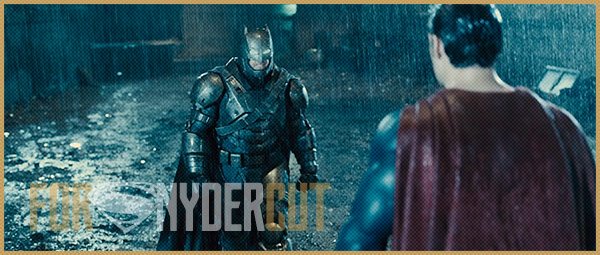
Batman v Superman Returns Soul to Superheroes
by ARMOND WHITE
Zack Snyder dares to infuse the comic-book genre with moral and political substance. Fanboys do not own the franchises of Batman and Superman movies, so director Zack Snyder went against the mob and dared to raise the genre to a level of adult sophistication in 2013’s Man of Steel, the most emotionally powerful superhero movie ever made. (Fanboys hated it.) Snyder’s sequel, Batman v Superman: Dawn of Justice adds politics, bringing to the fantasy some contemporary, real-world concerns. This is not conventional comic-book allegory; rather, Snyder uses the figures of Batman (Ben Affleck) and Superman (Henry Cavill) walloping each other to give visible substance to social and moral issues, much as Greek tragedy does. He takes the wildest, Bizarro World fiction — of two superheroes turned super foes — and uses the premise to explicate our current dilemmas concerning power, principles, and divinity.
It helps that Snyder is also visionary, inclined to extravagant spectacle and gifted with a signature erotic touch. An early montage equates violence, wealth, loss, and grief through symbolic images of bullets, pearls, blood, and tears. It is witnessed by the young Bruce Wayne, a paranoid orphaned millionaire who misconstrues Superman’s involvement in the previous film’s battle that devastated Metropolis (and traumatized nearby Gotham City), and so he vows a vigilante’s revenge. With its legal-brief title, Batman v Superman reflects the confusion that pits secularists against believers, and the partisanship that inhibits national alliance. This tension is so visually amped up that the opposition of Batman to Superman feels revelatory: Man versus the god in Man.
Snyder’s opening sequences interweave the origin stories of these mythic heroes and their alter egos. What has become overly familiar through years of repetition acquires new dynamism — and new understanding — that particularizes and personalizes each wounded man’s suffering. Not only are these time-shifts audacious (movie marquees announce the 1940 The Mark of Zorro and the 1981 Excalibur — implying the evolution of history), but so is Snyder’s proposition about the nature of heroism and vengeance: Both stem from the way individuals react to and comprehend their experiences. Snyder’s thrillingly intelligent use of interior conflict and political antagonism vastly outclasses Christopher Nolan’s Batman trilogy: Batman Begins, The Dark Knight, and The Dark Knight Rises — all noxious — which were bellwethers of our culture’s decline.
Fanboys prefer the Nolan films for their “darkness,” which emphasized the sophomoric, pseudo-tragic elements of the Batman graphic novels. But Snyder’s more adult treatment finds the material’s emotional core. This displeases the fanboy/hipster whose adolescent embarrassment about feelings was exploited through Nolan’s emotionless violence and post–9/11 nihilism. Snyder counters that cultural crisis and (through the script by Chris Terrio and David S. Goyer) visualizes the millennial moral struggle as pop myth. His essential subject is mankind’s struggle to discover compassion as well as common obligation — or dare I use the non-political term: brotherhood?
The pain of post–9/11 as reflected in Nolan’s Batman films was a paradigm shift. But fantasy cannot conscientiously be enjoyed Nolan’s way, without any sense of social, historical, or moral consequence. Snyder manipulates this new paradigm so that mankind’s sense of mortality is embodied by Batman, Superman, and their arch-nemesis, Lex Luthor. (All three characterization performances are, well, perfect.) When Superman’s motives are questioned, the skepticism and vilification create an antagonism between him and Batman that Snyder lays out as an ideological conflict and that Luthor exacerbates. Luthor (Jesse Eisenberg, who played Mark Zuckerberg in The Social Network and thus personifies the craven millennium) cynically whines about “The oldest lie in America: that power can be innocent.” He even threatens a senator (Holly Hunter) who heads an investigation into Superman’s guilt. Luthor’s obsession with Superman (“He answers to no one. Not even, I think, to God”) reveals envy that is unmistakably demonic; a development that coheres with Snyder’s spiritual-social vision of post–9/11 grief and desire for salvation. He creates the year’s first great movie image by examining Superman’s “divinity” when he is surrounded by Day of the Dead multitudes. The image echoes our current desperation regarding “populism” — and that’s truly audacious.
Ben Affleck as Batman Among today’s outstanding American filmmakers, Snyder has an eccentric interest in the spiritual expression of his characters’ conflicts. From the erotic antiquity saga 300 to the anthropomorphic fable Legend of the Guardians: The Owls of Ga’Hoole, Snyder demonstrates a caricaturist’s knack for elaborating Good vs. Evil. It takes just such dreamlike moral clarity to reprove the Nolan trilogy’s chaos. Look at Snyder’s second high point: Batman’s nightmare of battling Superman plus his own enigmatic demons imagined as Stymphalian wasps. The scene spins agonizingly slowly (though not in slow motion), becoming ever more hallucinatory. It fuses comic-book imagery to the oldest Western myths.
In this age of petty Marvels, most comic-book movies merely perpetrate fantasies of power, but Snyder, enacting his personal aesthetic, braves a film that examines those fantasies. He boldly challenges popular culture’s current decay. Man of Steel was a magnificent, hugely satisfying response to what’s often missing in pop culture, and Batman v Superman raises more ideas without (yet) resolving them. An attempt to invoke other superheroes from the DC Comics stable, starting with Wonder Woman (Gal Gadot, accompanied by tribal drums that recall Snyder’s overawed feminist fantasia, Sucker Punch), ultimately goes unfulfilled. And Snyder, obliged to placate the Marvel hordes, lets a couple of fight scenes devolve into Avengers-trite turmoil.
Still, the equation of moral myth and contemporary political catastrophe marks an important advance. Snyder intends to resolve the conflict between commerce and art, power and morality. “Knowledge with no power is paradoxical,” one character says. “Man made a world where standing together is impossible,” frets another. With Batman v Superman, the battle for the soul of American culture is on.
OL:http://www.nationalreview.com/article/433246/batman-v-superman-culture-war-gets-mythic
